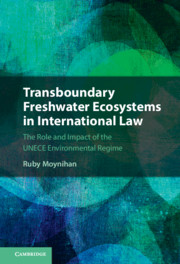 Transboundary Freshwater Ecosystems in International Law
Transboundary Freshwater Ecosystems in International Law Book contents
- Transboundary Freshwater Ecosystems in International Law
- Transboundary Freshwater Ecosystems in International Law
- Copyright page
- Dedication
- Epigraph
- Contents
- Figures
- Preface
- Acknowledgements
- Treaties and Other Instruments
- Table of Cases
- Abbreviations
- 1 The Role of International Law in Addressing the Global Freshwater Ecosystem Crisis
- 2 Conceptualising the UNECE Water and Environmental Regime
- 3 Contemporary Status of International Law on Transboundary Freshwater Ecosystems
- 4 The Common Normative Framework of the UNECE Environmental Regime and Its Contribution to International Water Law
- 5 An Ecosystem Approach in International Law Concerning Transboundary Freshwater Ecosystems
- 6 Public Participation
- 7 River Basin Organisations, Basin Agreements and European Environmental Law in the UNECE Regime
- 8 Transboundary Freshwater Ecosystems in International Law
- Bibliography
- Index
3 - Contemporary Status of International Law on Transboundary Freshwater Ecosystems
Published online by Cambridge University Press: 01 October 2021
- Transboundary Freshwater Ecosystems in International Law
- Transboundary Freshwater Ecosystems in International Law
- Copyright page
- Dedication
- Epigraph
- Contents
- Figures
- Preface
- Acknowledgements
- Treaties and Other Instruments
- Table of Cases
- Abbreviations
- 1 The Role of International Law in Addressing the Global Freshwater Ecosystem Crisis
- 2 Conceptualising the UNECE Water and Environmental Regime
- 3 Contemporary Status of International Law on Transboundary Freshwater Ecosystems
- 4 The Common Normative Framework of the UNECE Environmental Regime and Its Contribution to International Water Law
- 5 An Ecosystem Approach in International Law Concerning Transboundary Freshwater Ecosystems
- 6 Public Participation
- 7 River Basin Organisations, Basin Agreements and European Environmental Law in the UNECE Regime
- 8 Transboundary Freshwater Ecosystems in International Law
- Bibliography
- Index
Summary
This chapter provides an understanding of where international law is at (including customary international law, treaty and case law) in terms of its achievements and shortcomings regarding cooperation over environmental protection and use of transboundary freshwater ecosystems. This work provides a basis for critical analysis over the proceeding book chapters, in relation to the value added by the UNECE. The chapter lays the foundations for determining the UNECE regime’s relationship to international water law, international environmental law and general international law. It explores the role of international courts and the international law commission in interpreting outdated water treaties and bringing their standards of environmental protection closer to contemporary scientific understandings and the more progressive multilateral environmental agreements in accordance with the principle of systemic integration. It also explores instances where Courts have arguably has not gone far enough, leaving gaps in understanding. Unlike Courts, pan-regional or basin treaties and their river basin commissions can develop and interpret rules and principles of international water law on a continual and comprehensive basis and provide the institutional framework which supports implementation and compliance with international water law. This hypothesis, on the added value of the UNECE water regime, is tested over the proceeding chapters.
Keywords
- Type
- Chapter
- Information
- Transboundary Freshwater Ecosystems in International LawThe Role and Impact of the UNECE Environmental Regime, pp. 51 - 100Publisher: Cambridge University PressPrint publication year: 2021


